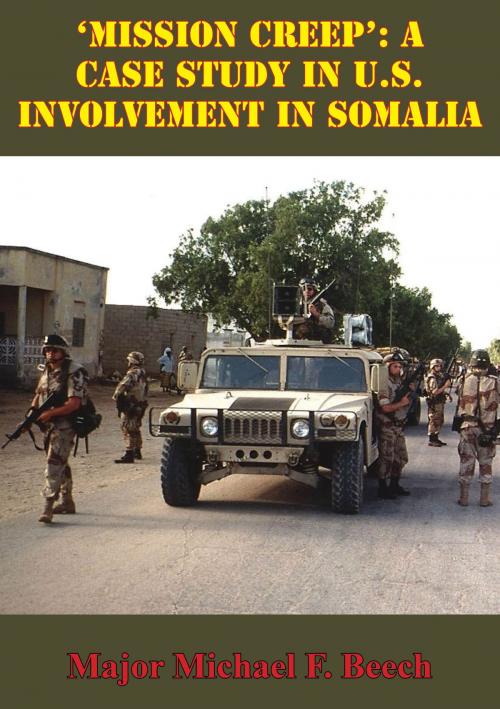‘Mission Creep’: A Case Study In U.S. Involvement In Somalia
Nonfiction, History, Middle East, Persian Gulf War, Military| Author: | Major Michael F. Beech | ISBN: | 9781782895169 |
| Publisher: | Tannenberg Publishing | Publication: | August 15, 2014 |
| Imprint: | Tannenberg Publishing | Language: | English |
| Author: | Major Michael F. Beech |
| ISBN: | 9781782895169 |
| Publisher: | Tannenberg Publishing |
| Publication: | August 15, 2014 |
| Imprint: | Tannenberg Publishing |
| Language: | English |
This monograph explores the problem of mission creep. The trend toward ethnic and regional unrest has characterized the world security environment since the breakup of the former Soviet Union. The U.S. has struggled to find its place in the new world order. As a result US military forces have increasingly found themselves involved in various operations other than traditional warfare. Often the political aims of these operations are difficult to identify and translate into military operational objectives and end states. Worse yet, the political aims themselves are prone to rapidly shift and evolve from those originally intended, leaving the military commander the difficult task of catching up with policy or even guessing at the political objectives. This uncertain environment sets the conditions for the delinkage between the political goal and military operations which may result in disaster. The monograph examines US operations in Somalia to provide the data for the analysis in order to determine the factors which contribute to mission creep. Examining US-Somalia policy from 1992 (Operation Restore Hope) to Oct. 1993 (United Nations Operations in Somalia II) this monograph analyses the evolution of national policy objectives and the military and political operations undertaken to achieve those objectives. An analysis of operational and tactical objectives and end states as well as military methods determines the factors which contributed to the failed US involvement in UNOSOM II. In addition, the monograph identifies the Somali geo-political, historical, cultural, and economic factors which influenced US operations. This monograph concludes that contradictory and uncoordinated national strategy and political policy resulted in poor operational planning and execution. There were also significant factors at the operational level which contributed to the failed US intervention.
This monograph explores the problem of mission creep. The trend toward ethnic and regional unrest has characterized the world security environment since the breakup of the former Soviet Union. The U.S. has struggled to find its place in the new world order. As a result US military forces have increasingly found themselves involved in various operations other than traditional warfare. Often the political aims of these operations are difficult to identify and translate into military operational objectives and end states. Worse yet, the political aims themselves are prone to rapidly shift and evolve from those originally intended, leaving the military commander the difficult task of catching up with policy or even guessing at the political objectives. This uncertain environment sets the conditions for the delinkage between the political goal and military operations which may result in disaster. The monograph examines US operations in Somalia to provide the data for the analysis in order to determine the factors which contribute to mission creep. Examining US-Somalia policy from 1992 (Operation Restore Hope) to Oct. 1993 (United Nations Operations in Somalia II) this monograph analyses the evolution of national policy objectives and the military and political operations undertaken to achieve those objectives. An analysis of operational and tactical objectives and end states as well as military methods determines the factors which contributed to the failed US involvement in UNOSOM II. In addition, the monograph identifies the Somali geo-political, historical, cultural, and economic factors which influenced US operations. This monograph concludes that contradictory and uncoordinated national strategy and political policy resulted in poor operational planning and execution. There were also significant factors at the operational level which contributed to the failed US intervention.




![Cover of the book U.S. Marines In Battle: An-Najaf, August 2004. [Illustrated Edition] by Major Michael F. Beech](https://www.kuoky.com/images/2014/august/300x300/9781782893929-K8hX_300x.jpg)






![Cover of the book Scouts Out! The Development Of Reconnaissance Units In Modern Armies [Illustrated Edition] by Major Michael F. Beech](https://www.kuoky.com/images/2014/august/300x300/9781782899129-W8Ew_300x.jpg)



